I have been reading this week about a report from Savills,
which talks about celebrating bedsit style accommodation in our cities as the Japanese do. This is all very well is the centre of London with all its social and employment benefits. But the concept of shoebox living doesn’t work in some of the communities that my company is working in.
One of most sustainable things we can do with our housing is to build housing that allows the development of a mixed and balanced community and that represents the needs and aspirations of all aspects of the population.
We all know of examples of where concentrations of monocultural housing can lead to serious social issues. The town I was born in, Morecambe, like many seaside towns has suffered tremendously by HMO concentrations caused by well meaning but seriously flawed housing benefits policies whereby it became financially beneficial for private landlords to subdivide their properties into multi occupancy and particularly into bedsits.
At HemingwayDesign we have been working in Boscombe , the most deprived ward in the South West, a coastal ward of Bournemouth which is ranked as the 113th most deprived ward out of 32, 482 wards nationally. Our project was to look at the issues of a conservation area of Boscombe, Churchill Gardens, which whilst containing some lovely old properties set around a nice green square, had developed a negative reputation within the wider Bournemouth community.
There are 86 properties in Churchill Gardens subdivided into 345 homes. These homes are broken down into 191 bedsits 131 self contained flats and 13 family homes. Of these 345 homes only 33 are owner occupied, the balance, 312 are in the private rental sector. 55 per cent of the properties are bedsits compared to a national average of around 2 per cent. Only 3.8 per cent of the homes are family homes compared to over 60 per cent nationally. In short Churchill Gardens is so far out of kilter with normality that it is almost inevitable that it will be perceived as being “a freak” by the wider community and with its lack of a balanced and mixed community, experience shows that the social issues that exist there could easily be predicted.
We were introduced to a local private landlord with over 3000 properties in the area and was keen to try and help address the issues within Churchill Gardens and some produced by the landlord were real eye openers and clearly showed how financially beneficial it is to convert large properties to bedsits.

One of our conclusions was that the tenure mix must be closer to the regional and national situation. It is clearly not possible for this to happen in giant steps but a “chain reaction” needs setting off to start the transformation.
To achieve even baby steps would require a significant shift from the current preponderance of bedsits to a mix of flats and houses that starts to get closer to representing the regional and national balance.
In the absence of any planning/legal powers to achieve this then it would rely on the goodwill of landlords who are economically successful with the current status quo. And then comes the bombshell, the new Local Housing Allowance will certainly result in demand for smaller accommodation growing. From January benefit claimants aged 35 and under can only claim the single room allowance rather than the allowance for a one bed property. In Boscombe the estimate is that 550 claimants will be negatively impacted. This will have the negative knock on impact of increasing demand for bedsits. The result is that wards like Boscombe will suffer unless there is an understanding that one size doesn’t fit all.
Therefore it is imperative that some council’s can seek to agree one area lettings policy with all landlords in the area to assist developing mixed communities and reduce housing management issues related to single person households. Landlords need to be encouraged (through local tax benefits?) to convert bedsits to larger units to balance the offer.
However in the absence of any planning/legal powers to achieve this then it would rely on the goodwill of landlords who are economically successful with the current status quo.